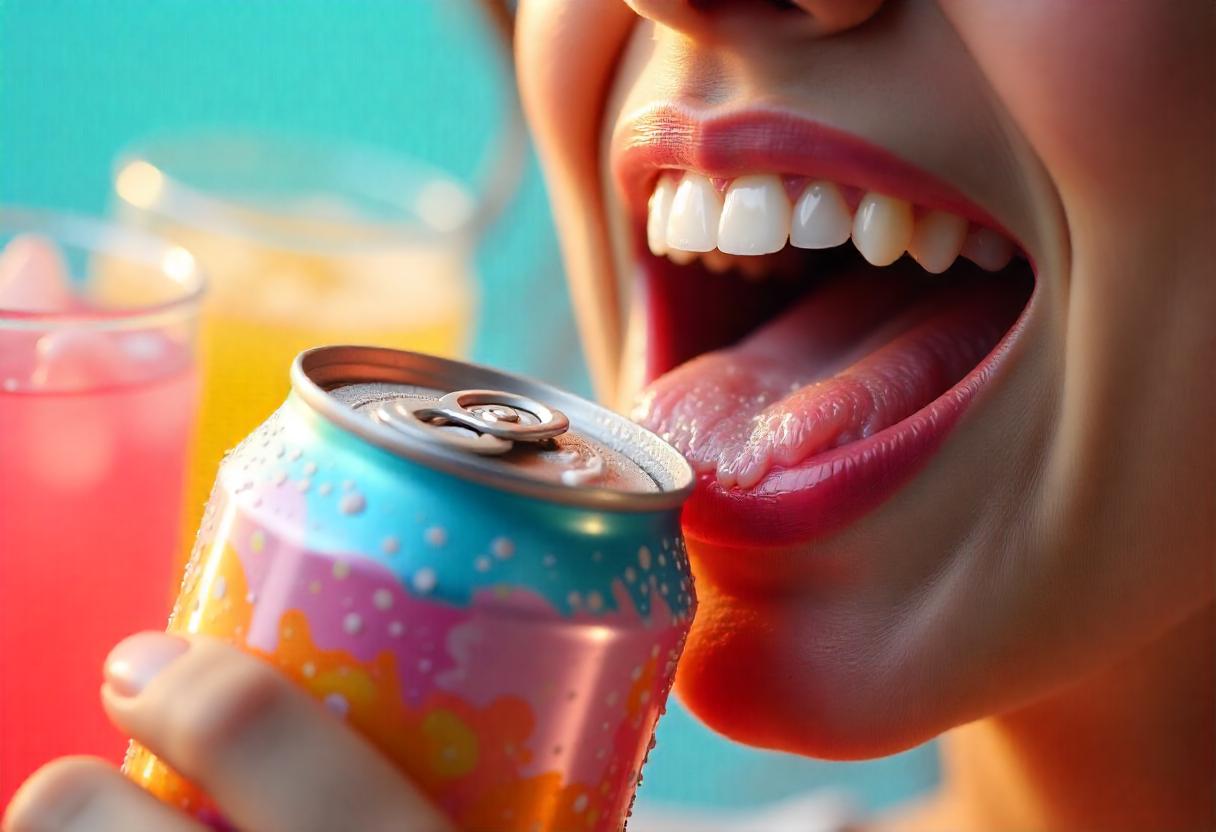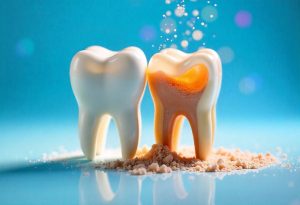How Does Sugar Really Affect Your Teeth?

We all know that sugary treats aren’t exactly health food, but have you ever stopped to think about what sugar actually does to your teeth? It’s more than just a fleeting moment of sweetness on your tongue – sugar has a lasting impact on your oral health.
This blog post delves into the science behind sugar’s effect on your teeth, explores the consequences of excessive sugar consumption, and provides practical tips to protect your smile.
The Science Behind How Sugar Causes Cavities
To understand sugar’s impact, we need to look at the microscopic world inside your mouth. It’s a bustling ecosystem of bacteria, and some of these tiny organisms have a particular fondness for sugar.
Sugar’s Role in the Cavity Process:
-
Bacterial Feast: Bacteria like Streptococcus mutans and Streptococcus sobrinus thrive on sugar. When you consume sugary foods or drinks, these bacteria feast on the sugar molecules.
-
Acid Attack: As the bacteria metabolise the sugar, they produce acids as a byproduct. These acids are the real culprits behind tooth decay.
-
Enamel Erosion: The acids lower the pH level in your mouth, creating an acidic environment that begins to dissolve the protective enamel on your teeth. This process is known as demineralisation.
-
Cavity Formation: If this demineralisation continues over time, it can lead to the formation of cavities (dental caries), which are essentially holes in your teeth.
The pH Scale and Your Teeth:
The pH scale measures acidity and alkalinity. A pH of 7 is neutral, while lower numbers indicate acidity and higher numbers indicate alkalinity. Your tooth enamel starts to demineralise at a pH of around 5.5. Saliva plays a crucial role in neutralising acids and helping to remineralise your teeth, but it can’t always keep up with a constant barrage of sugar.

What are the Different Types of Sugars and How Do They Affect Teeth?
Not all sugars are created equal when it comes to their impact on your teeth.
-
Natural Sugars: These are found naturally in fruits, vegetables, and dairy products. While they can still contribute to tooth decay, they are generally less harmful than added sugars because they are often accompanied by fibre, which helps to slow down the absorption of sugar.
-
Added Sugars: These are sugars that are added to foods and drinks during processing or preparation. They are often found in processed foods, sugary drinks, sweets, and desserts. Added sugars are a major contributor to tooth decay because they provide a concentrated source of fuel for acid-producing bacteria.
Hidden Sugars: Be aware of hidden sugars lurking in foods that you might not expect, like sauces, condiments, bread, and even some savoury snacks. Always read food labels carefully to identify added sugars.
How Does Sugar Lead to Enamel Erosion?
Enamel erosion is the irreversible loss of tooth enamel, the hard, outer layer of your teeth. While acids from bacteria are the primary cause, sugar plays a significant role in fuelling the production of those acids.
Signs and Symptoms of Enamel Erosion:
- Sensitivity: Your teeth may become sensitive to hot, cold, or sweet foods and drinks.
- Discolouration: Your teeth may appear yellow or translucent as the enamel thins.
- Rounded teeth: The edges of your teeth may become rounded or worn down.
- Transparency: Your front teeth may start to look slightly transparent near the biting edges.
Long-Term Consequences:
Enamel erosion can lead to serious dental problems, including increased sensitivity, an increased risk of cavities, and even tooth loss in severe cases.
The Surprising Link Between Sugar and Gum Disease
Sugar doesn’t just affect your teeth; it can also contribute to gum disease. When plaque builds up along the gum line, it can irritate the gums and lead to inflammation, a condition known as gingivitis. If left untreated, gingivitis can progress to periodontitis, a more serious form of gum disease that can damage the tissues and bones supporting your teeth.
How to Protect Your Teeth from the Effects of Sugar
Reducing your sugar intake is the most effective way to protect your teeth. Here are some practical tips:
- Limit Sugary Drinks: Sugary drinks like soda, juice, and sports drinks are a major source of added sugars. Opt for water, unsweetened tea, or milk instead.
- Choose Healthy Snacks: Reach for fruits, vegetables, nuts, or cheese instead of sugary snacks.
- Read Food Labels: Pay attention to the amount of added sugar in processed foods. Look for hidden sugars like high-fructose corn syrup.
- Practise Good Oral Hygiene: Brush your teeth twice a day with fluoride toothpaste and floss daily.
- Visit Your Dentist Regularly: Schedule regular dental check-ups and cleanings to remove plaque and tartar buildup.

Children’s Teeth and Sugar: What Parents Need to Know
Children are especially vulnerable to the effects of sugar on their teeth. Baby teeth are more susceptible to decay, and frequent sugar consumption can set the stage for a lifetime of dental problems.
- Limit Sugary Drinks and Snacks: Offer water and healthy snacks instead of sugary treats.
- Be Mindful of Hidden Sugars: Many processed foods marketed to children contain high amounts of added sugars.
- Establish Good Oral Hygiene Habits: Help your child brush their teeth twice a day and floss daily.
Sugar and Orthodontic Treatment: Extra Care for Braces
If you or your child has braces, it’s even more important to be mindful of sugar consumption. Food particles and plaque can easily get trapped around brackets and wires, increasing the risk of demineralisation and cavities.
- Brush and Floss Carefully: Use special orthodontic tools to clean around braces effectively.
- Limit Sugary and Sticky Foods: Avoid sticky candies, chewy sweets, and sugary drinks that can cling to braces.
Conclusion
Sugar’s impact on your teeth is significant and can lead to a range of dental problems, from cavities and enamel erosion to gum disease. By understanding the science behind sugar’s effects and taking proactive steps to reduce your sugar intake and maintain good oral hygiene, you can protect your smile and enjoy a lifetime of healthy teeth.
References:
https://www.sciencedirect.com/topics/medicine-and-dentistry/streptococcus-mutans
https://www.webmd.com/oral-health/gingivitis-periodontal-disease
https://www.webmd.com/oral-health/understanding-strep-throat-basics
